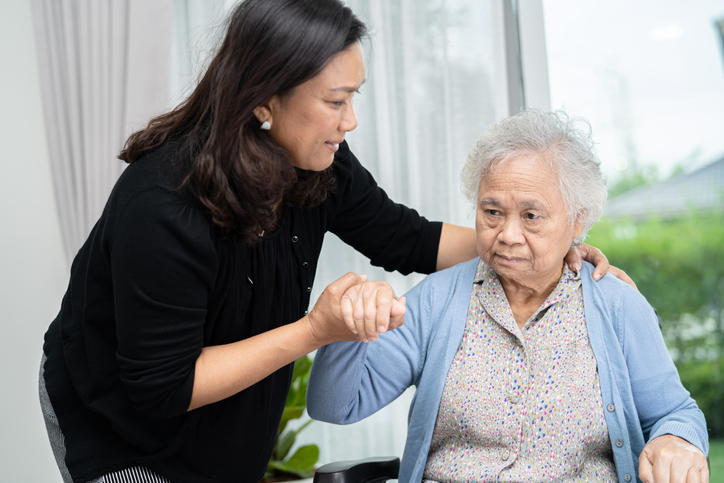For more than a decade, I was a long-distance caregiver to my mother and mother-in-law. In my mother’s column: two strokes, two middle-of-the-night blood clot surgeries, and a raging staph infection. In my mother-in-law’s: cancer, hand surgeries, and frequent falling. Even though they lived in different states, I sometimes made the rounds to visit both women in one day, driving more than 200 miles in the process. I’d spend the next day in bed, physically and emotionally wiped out.
It doesn’t matter where your relatives live, whether it’s with you or on the other side of the country. When you are caring for more than one person at a time—two parents, a parent and an in-law, a parent and a child, a stepparent and a spouse—it is draining. They all have needs and meeting some of those needs requires your direct involvement. Add to that different health issues, personalities, and family history and you’re bound to become exhausted.
“It’s overwhelming to take care of one person, let alone more,” says Atlanta social worker Nancy Kriseman. “People have to sort out what they can realistically do.
Caregivers should also identify and expand what Kriseman, the author of “The Mindful Caregiver,” calls their “circle of support.” The goals are to provide care and social interaction for your loved one, as well as find relief as the caregiver. Who else can help—children, grandchildren, nieces and nephews, neighbors, church members, a geriatric care manager, or paid help?
Finding support isn’t only about finding other people to help with day-to-day tasks. There may be programs where your loved ones can meet and interact with others and housing that offers services and perks that help them live more independently. Contact their local Area Agency on Aging, senior centers, and naturally occurring retirement communities to learn more.
Here are other expert suggestions for caring for more than one person at a time:
Review Your Situation
Realistically, you can’t do it all yourself, but you can be there for your relatives in a myriad of ways. Decide what belongs on your It-Has-to-Be-Me list and delegate the other tasks that crop up. For instance, can someone else accompany your relatives to appointments, explore transportation services (e.g., Silver Ride, Lyft, Uber, community providers), manage their finances, research resources, or order items (e.g., clothing, food, supplies, toiletries) online to cut down on trips to the store? Can a high school or college student run errands for you or your relative to lighten your load?
Froma Walsh, a psychologist and co-director of the Chicago Center for Family Health at the University of Chicago, thinks a “caregiving team” approach works well. “Like a sports team, they have a captain—the primary caregiver—but each sibling has a valuable role to play on the team,” affirms Walsh, who is also the author of “Strengthening Family Resilience.”
She suggests in-person “team meetings” or, if that’s not possible, Skype, FaceTime, or phone meetings, to discuss how to be a successful team. (Tip: Identify each person’s strengths and constraints and assign or volunteer for duties with those in mind.) “This promotes collaboration, mutual support, and shared burdens and joys of involvement,” she says. “A caregiving crisis can become an opportunity to forge stronger sibling bonds.”
Related article: Finding Quality Senior Care
Involve Your Children
Older children, teens, and young adults can help, and many will want to. Walsh suggests holding a Family Brainstorming Meeting in which the kids contribute to solving problems and making plans. This will help them to feel valued and gain a sense of maturity and responsibility in supporting their parents and grandparents. It might mean preparing a weekly meal for the family or spending additional time with their grandparents. “In a team approach, the kids pitch in and they gain appreciation of their parents’ love and their challenges,” explains Walsh.
Let Go
Some people think they’re the only one who can do the job right. Carol Bradley Bursak regrets that she didn’t let her sister and others help more. She felt compelled to visit her mother, father, and mother-in-law every day, even when they were well cared for.
Bursak, of Fargo, North Dakota, also had a husband and a child at home, both with medical needs, and a job as a librarian. At one point, Bursak was caring for five people in three different places!
“My family members would have the smallest need and I would take care of it right away. I knew how lonesome, in pain, or confused they were. I wanted to fix it so badly that I didn’t take care of myself,” recalls Bursak, who used her personal experiences to write “Minding Our Elders.” “I had help but didn’t take advantage as much as I could have,” she recalls.
Remember the Rest of Your Family
Don’t ignore Mom’s urgent needs, but don’t forget about your spouse or kids, either. Pam Flores, a Chicago public relations professional, and her husband spent all last summer shuttling between his mother and hers. Because of this, Flores missed her high school daughter’s traveling hockey games and time together at the beach. “My daughters will be going to college and I feel there has been no time for them,” she says. “My husband and I feel we’re […] so stressed out that it’s hard to enjoy the kids.”
It can help to carve out regular one-on-one or group time, such as weekly pizza nights, biweekly date nights, or an hour or two a week with each child to do something special—even if it’s a snuggle on the couch, a walk with the dog, or whatever you two decide. Just remember that there will be times when you simply can’t find time for everyone. Accept the limitations of what you can do for any one person and do not judge yourself if you can’t be available 24/7 to attend to a crisis.
Practice Saying No
It’s okay to decline yet another responsibility, task, or event. You have to be self-protective to ward off burn-out and resentment. Set boundaries from the start and don’t forget to think about yourself. You need to stay healthy, strong, and sane if you’re going to help others.
My parents and my mother-in-law gave me a gift: encouraging me to spend time with my spouse and children and not making me feel guilty for missing a visit. That said, I still felt pulled in multiple directions (my mother, my mother-in-law, and my husband and kids).
You might never stop feeling guilty for all the times you’re not there, but know that you don’t have to. When you’re caring for more than one person, there’s bound to be less time for each of them. So, as my 91-year-old mother used to tell me, “Give up the need for perfection and shoot for good enough.”






